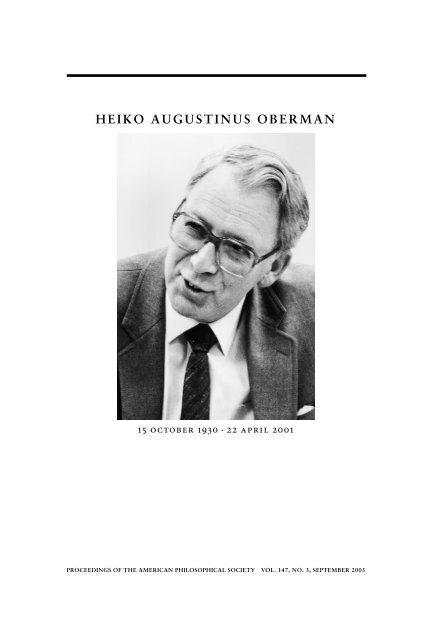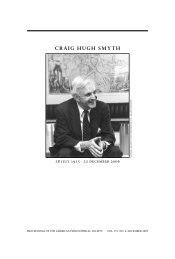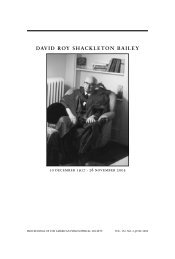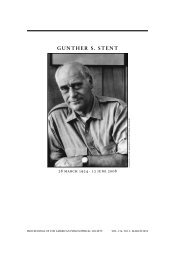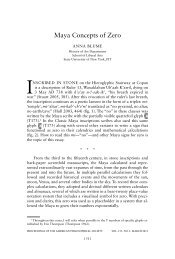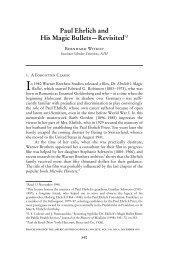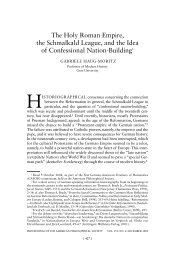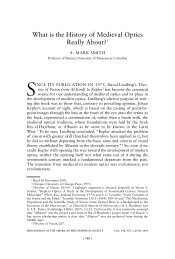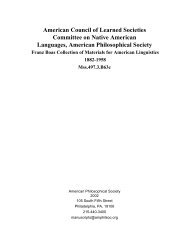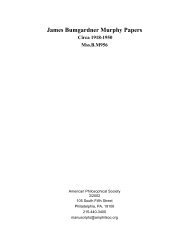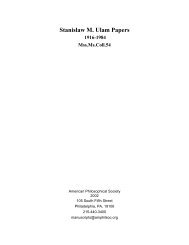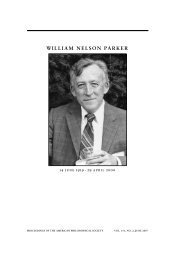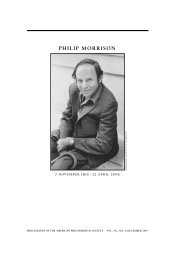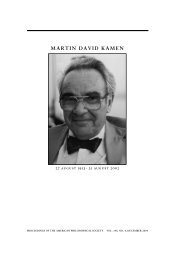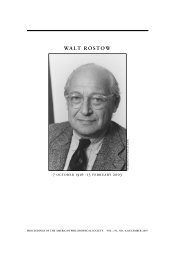HEIKO AUGUSTINUS OBERMAN - American Philosophical Society
HEIKO AUGUSTINUS OBERMAN - American Philosophical Society
HEIKO AUGUSTINUS OBERMAN - American Philosophical Society
Create successful ePaper yourself
Turn your PDF publications into a flip-book with our unique Google optimized e-Paper software.
<strong>HEIKO</strong> <strong>AUGUSTINUS</strong> <strong>OBERMAN</strong><br />
15 october 1930 . 22 april 2001<br />
PROCEEDINGS OF THE AMERICAN PHILOSOPHICAL SOCIETY VOL. 147, NO. 3, SEPTEMBER 2003
iographical memoirs<br />
AT ALMOST the same time that the borderland between biology<br />
and chemistry was developing into a territory in its own right,<br />
the boundaries between various of the conventional “periods”<br />
and specialties of traditional modern historiography were becoming<br />
increasingly permeable. Led by several members of the <strong>American</strong> <strong>Philosophical</strong><br />
<strong>Society</strong>, the effort to see late antiquity as an identifiable period of<br />
“post-classical” and yet “pre-medieval” and “pre-Byzantine” history has<br />
by now matured enough to produce various graduate programs, a substantial<br />
reference book, and an ever-growing bibliography of monographs.<br />
Meanwhile, at the other end of medieval history, the categories of<br />
“Ren ‘n Ref” with which my generation grew up in the 1940s have<br />
also given way to a similar redrawing of the map: the renowned Institut<br />
für Reformationsgeschichte at the University of Tübingen is now called<br />
Institut für Spätmittelalter und Reformation. It acquired that new name<br />
when its longtime director, the German Reformation scholar Hanns<br />
Rückert, was succeeded in 1966 by the Dutch/<strong>American</strong> scholar Heiko<br />
Augustinus Oberman, then thirty-five years old. His Jünglingswerk,<br />
entitled, with echoes of his countryman Johan Huizinga’s Waning of the<br />
Middle Ages of 1919, was The Harvest of Medieval Theology: Gabriel<br />
Biel and Late Medieval Scholasticism, which Harvard University Press<br />
published in 1963 while the author was a member of the Harvard faculty.<br />
It had described the thought of the later Middle Ages neither as a<br />
betrayal of the supposedly grand synthesis of “the thirteenth, the greatest<br />
of centuries” and its Thomism, nor as a self-effacing “forerunner”<br />
(à la St. John the Baptist) of Luther and the Reformation, but as a philosophical<br />
and theological phenomenon that deserved attention in its own<br />
right. It is fair to say that Reformation history has never been the same<br />
since that book, and many of the major chairs in the field here and<br />
abroad are now held by scholars, not all of them Obermanschüler in the<br />
formal sense, who, instead of producing yet another dissertation on<br />
Luther or Calvin, worked on figures of the fifteenth and early sixteenth<br />
century such as Jean Gerson or Johann Staupitz or Gabriel Biel.<br />
From The Harvest of Medieval Theology it would have been possible<br />
for Heiko Oberman to move in several directions. Its insights into<br />
what happened to the understanding of the relation between divine<br />
grace and human free will, for example, could have led Oberman<br />
straight back to a fundamental reconsideration of the philosophicaltheological<br />
system of Augustine, with which he had dealt en passant in<br />
his first book, Archbishop Thomas Bradwardine, a Fourteenth Century<br />
Augustinian of 1957. This would have entailed an examination of<br />
the fateful consequences of “Augustine’s failure to learn Greek,” which<br />
Peter Brown has called “a momentous casualty of the Late Roman educational<br />
system,” as a result of which “he will become the only Latin<br />
[294]
heiko augustinus oberman 295<br />
philosopher in antiquity to be virtually ignorant of Greek.” Despite<br />
several brilliant essays on that prehistory, including a provocative article<br />
already in 1962 on the patristic and medieval history of the concept of<br />
tradition in relation to Scripture, his scholarly interests—and, it seems<br />
quite clear, also his own existential concerns—moved into the center of<br />
Reformation studies. As an ordinarius at the University of Tübingen,<br />
which has both a Roman Catholic theological faculty and a Protestant<br />
one, he was fascinated by the role of the sixteenth-century universities<br />
not only in the genesis of Reformation ideas but in their dissemination<br />
throughout Europe. His Werden und Wertung der Reformation of 1977,<br />
whose English translation of 1981 carries the unfortunately individualisticsounding<br />
title Masters of the Reformation, is in fact a history of the<br />
founding of the University of Tübingen (“Initia Universitatis” is the subtitle<br />
of its first part) seen as a portrait of the Reformation as a whole.<br />
It was unavoidable that this grounding in the vocabulary of the<br />
nominalists, the structure of the universities, and the coming-of-age of<br />
the nationalities in the sixteenth century would prepare Heiko Oberman<br />
to redefine the study of the thought and personality of Martin Luther.<br />
While initially shaped by the picture of Luther’s theology that had come<br />
from the work of his colleague and mentor, Gerhard Ebeling (to whom<br />
Werden und Wertung der Reformation was dedicated), Oberman’s predominantly<br />
historical methodology moved beyond Ebeling’s predominantly<br />
theological concentration to produce a portrait of Luther in<br />
which the Reformer’s personal struggles were seen as Luther himself had<br />
seen them: Luther: Man Between God and the Devil (Berlin, 1982; New<br />
Haven, 1989). Translated into several languages, this study corrected the<br />
tendency of many biographers to make Luther the young rebel seem<br />
more “modern” than in fact he was, while avoiding the Freudian and<br />
Marxist reductionisms that were so fashionable a decade or two ago.<br />
Nor was Oberman blind to the darker side of all of this. While he<br />
was working on his Luther, he was also preparing what became in many<br />
ways his most provocative and controversial book, published in 1981 in<br />
German, in 1983 in Dutch, and in 1984 in English: The Roots of Anti-<br />
Semitism in the Age of Renaissance and Reformation. Everybody knows<br />
about the vile language of Luther’s screeds against the Jews, which<br />
were collected into a special edition under the Nazis and which provoked<br />
the widely discussed From Luther to Hitler. Examining with great<br />
sensitivity and skill the implications but also the limitations of the usual<br />
apologetic distinction between “anti-Judaism” as a theological position<br />
and “anti-Semitism” as a racial and political position, Oberman’s<br />
book locates Luther’s vituperations in the late medieval context and<br />
asks both what he shared with his contemporaries and what made his<br />
rantings different from those of other sixteenth-century figures. For
296 biographical memoirs<br />
many readers, its most surprising, even shocking, section was the one<br />
dealing with Desiderius Erasmus, the scholar’s role model (and every<br />
Dutchman’s hero): his mastery of Greek and Latin makes his anti-<br />
Semitic rhetoric even more offensive in many ways.<br />
In 1984, Heiko Oberman returned to the United States, becoming<br />
professor of history, and four years later Regents’ Professor of History,<br />
at the University of Arizona, as well as director of its Division for Late<br />
Medieval and Reformation Studies. For almost two decades, several<br />
new generations of students flocked to his seminars and research institutes.<br />
Although he would sometimes complain (as do we all!) about<br />
their lack of preparation in languages, above all in his beloved Latin,<br />
and about their ignorance of the basic components either of the classical<br />
or of the Judaeo-Christian tradition (as a colleague of mine used to<br />
say, “They don’t know just what it is they ought to have such difficulty<br />
believing!”), he took them by the hand, firmly and even patiently, and<br />
introduced them to their ancestors. Almost in spite of themselves and<br />
without the prior benefits of a schooling in the classical Gymnasium,<br />
they became accomplished scholars—even if sometimes it took considerably<br />
longer than the university bureaucracy might have preferred.<br />
In each of his scholarly habitats—Utrecht, Indonesia, Oxford, Harvard,<br />
Tübingen, Arizona—Heiko Oberman was a scholar of almost<br />
overpowering energy, a teacher of profound dedication, and a colleague<br />
of rigorous demands but of no less unrelenting loyalties. Sometimes<br />
this integrity could make him seem acerbic, as I personally had<br />
reason to learn when we first met forty years ago. But his respect,<br />
which had to be earned, came to express itself in deepening friendship<br />
and generosity, even when differences both of belief and of style persisted.<br />
I was a guest of his Institut für Spätmittelalter und Reformation<br />
in Tübingen (when the Swabian countryside was in bloom and the trout<br />
were at their most succulent), and then of his Division for Late Medieval<br />
and Reformation Studies in Tucson. For both visits, the students<br />
were ready with sharp and well-informed questions (“Why did you close<br />
the first volume of The Christian Tradition at 600?” the Arizona cohort<br />
chanted in chorus, obviously having been rehearsed), and with several of<br />
them at both places I instituted a correspondence that went on for a couple<br />
of years. And I shall never forget the warm personal hospitality of<br />
Heiko and Toetie (Geertruida) Oberman on both occasions.<br />
Elected 1991<br />
Jaroslav J. Pelikan<br />
Sterling Professor of History Emeritus<br />
Yale University


